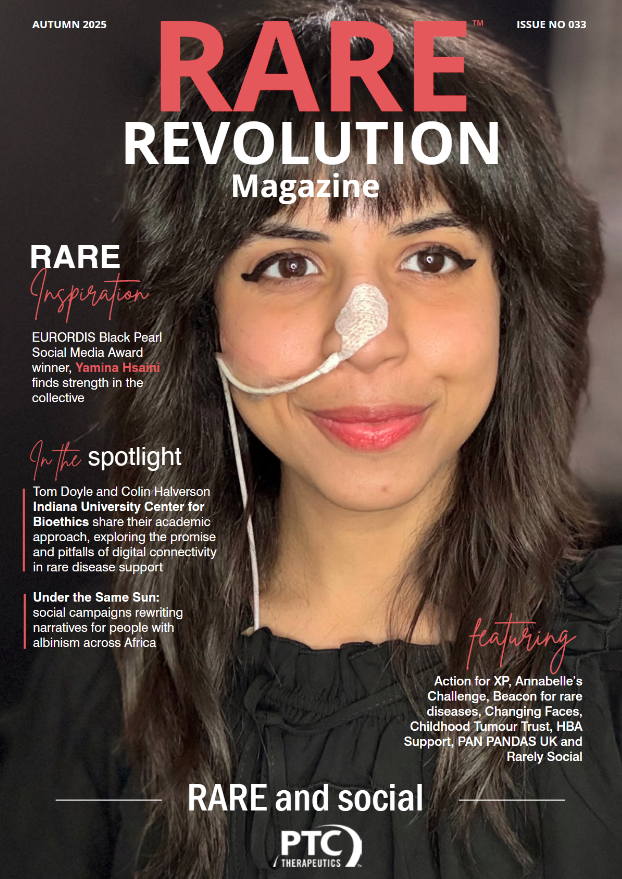NephCure: 25 years of advancing research, treatments and care for rare kidney diseases
SPONSORED CONTENT

NephCure has been leading the charge to empower those with rare protein-spilling kidney diseases, also known as glomerular diseases, for over two decades. By funding groundbreaking research, providing comprehensive patient support and driving policy change, NephCure is revolutionising care for these complex and often overlooked rare kidney diseases

Written by Emma Bishop
Interview with Britta Dornan, executive director, strategic relations, NephCure and Destiny Lalonde, content marketing manager, NephCure

NephCure is a not-for-profit patient organisation founded 25 years ago, by parents of children with rare forms of kidney disease. As with so many rare conditions, at that time, there was a scarcity of treatments, resources and medical expertise, and the founding parents wanted to effect change. As Britta Dornan, executive director, strategic relations, NephCure explains, “Our mission statement was then and remains today, to empower people with rare protein-spilling kidney disease (glomerular diseases) to take charge of their health, while leading the revolution in research, new treatments and care.”
The need for empowerment is close to Britta’s heart and something she acutely understands, having been diagnosed with primary lymphoedema 35 years ago, a rare condition with no known cause, treatment or cure. “I understand the frustrations that are shared by my fellow rare disease warriors. I was diagnosed in my early 20s and it was a very dark time in my life. It was impacting my career choice, where I lived, what I did, even the clothes I wore; everything, and the way I turned it around was to become empowered. I became educated and knowledgeable about my disease; I plugged into the community and I started giving back. This really began the healing process because it gave me hope and a sense of control, in a life where I don’t have control over my disease. I joined NephCure because they are deeply rooted in empowering patients.”
Britta manages NephCure’s partnerships and engagement with pharmaceutical companies, physicians and government, driving change at every level.
Destiny Lalonde is the content marketing manager for NephCure. Her role in empowering patients is by helping to amplify their voices in the sharing of their journeys and experiences. “No two people have the same story, but everyone relates in some way, it’s all interconnected. What’s important is how it resonates with other individuals, not just people already in our community, but new people who are joining and who might be scared, feel alone and unsure how to navigate the journey by themselves.” Sharing stories serves to strengthen the sense of community for this rare cohort.

There are around 150 different types of rare kidney disease, with NephCure’s primary focus being on the glomerular diseases. Unlike the more common causes of chronic kidney disease, glomerular diseases typically impact people in early adulthood, and they are among the most aggressive forms of kidney disease, where the glomerular filtration system in the kidneys is damaged, leading to protein spilling into the urine. “We know that no amount of persistent protein in the urine is OK”, states Britta. Data from the National Registry of Rare Kidney Diseases (RaDaR) in the UK, in 2023, showed that most IgAN (IgA nephropathy) patients with persistent protein progress to kidney failure within 10-15 years. RaDaR data in 2024 showed that rare kidney disease patients have a 28% higher rate of kidney failure when compared to chronic kidney disease patients over a five-year period.1,2,3 This disease progression can be devastating, particularly if it goes undiagnosed for any length of time, as Britta explains. “We see patients who have come “crashing” into dialysis, as we call it. They haven’t had a notable symptom, but one day find themselves in the emergency room and discover they have end stage kidney disease. It’s shocking.”
Britta explains that glomerular diseases are the more poorly understood conditions, with very few FDA approved treatments, and with only a few hundred nephrologists in the US specialising in this area. Some of the diseases are genetic, some autoimmune in nature and, for some, the underlying cause is just not known. Regulatory and policy hurdles make it difficult for patients to access new therapies, even when they become available, and the rare and debilitating nature of these diseases can take a significant toll on a patient’s mental health and quality of life.

Britta explains that having the word ‘cure’ in the name of their organisation is pivotal to their mission. “We won’t stop until we find cures. Dialysis and transplant are not acceptable as long-term treatment options.” She says that the founders’ initial aim was to raise money for research because, “before you can cure a disease, you have to understand it.” The organisation has funded more than $40 million in research over the last 25 years, leading to some ground-breaking discoveries. 15 years ago, it was discovered that certain variants in the APOL1 gene are associated with kidney disease in people of African and Caribbean descent.4 This opened up new avenues for clinical trials targeting these genetic factors.
NephCure-funded research has also led to the discovery of anti-nephrin autoantibodies (ANAAs) in the blood of patients with conditions such as focal segmental glomerulosclerosis (FSGS) and other minimal change diseases. (ANAAs are antibodies that attack nephrin, a protein in the kidney’s filters.) “It deepens our understanding of what might be causing the damage in their filtration units, which will no doubt result in the development of treatments for more personalised medicine, instead of this ‘trial and error’ approach.”
NephCure’s focus on funding research has been critical in advancing the scientific understanding of rare kidney diseases and enabling the development of new targeted therapies. It has been a driving force in the “revolution” it aims to lead in rare kidney disease treatments and care.

NephCure plays a key convening role in bringing together multiple stakeholders in the space. It connects patients and caregivers with glomerular disease specialists and with other patients and caregivers. It provides support in the form of in-person and virtual group meetings, educating them on issues of diet and nutrition and helping them navigate mental health issues. With strong industry relationships and knowledge of the clinical trial landscape, NephCure is perfectly placed to help ensure the community can participate in patient advisory boards, “so that from the very beginning pharmaceutical companies are incorporating the patient voice as they develop clinical trials”, explains Britta.
NephCure is planning on flexing its convening powers further for the benefit of the complement 3 glomerulopathy (C3G) community, this coming year. “C3G is an ultra-rare kidney disease comprised of a much smaller, very tight-knit community. It’s important that we recognise that these patients have their own specific challenges and experiences,” notes Britta. She says 2025 is expected to be a big year for C3G, with the potential for more treatments to come to market, both in the US and Europe. “However, these treatments run a risk of not reaching patients due to the complexities of the disease and the challenges of our healthcare system.”
To address these challenges, NephCure plans to increase outreach and support to the C3G and immune complex membranoproliferative glomerulonephritis (IC-MPGN) patient communities. Partnering with CompCure and the International Society of Glomerular Disease (ISGD), they will convene partners, including patients, researchers, physicians and pharmaceutical companies, to find workable solutions to reduce the burden of illness, modify disease progression and prevent dialysis and transplant.
Destiny highlights the importance of remaining mindful of their patient audiences and managing expectations, particularly around potential treatments. She says it’s about balancing communications between the disease areas with more research and potential treatments in the pipeline, with those smaller groups such as the C3G community. “It’s all about unity, making people feel heard, despite other potential breakthroughs coming through. We need to continue to give people hope, especially when their journey is so isolating.”
NephCure is uniquely positioned to act as a convener in this space, bringing together the various stakeholders to identify pathways for clinical trials and regulatory approval of new treatments.

A critical part of NephCure’s mission is centred around policy. It is currently working to get a federal bill passed called the “New Era of Preventing End-Stage Kidney Disease Act”. It is the only federal bill that focuses specifically on rare kidney disease. The bill aims to address the care upstream, supporting more research, promoting early intervention and diagnosis, addressing the health disparities in rural and disproportionately affected communities, enhancing provider education and reducing dialysis and transplantation costs.
“In the US, chronic kidney disease and kidney failure costs more than $124 billion a year. Dialysis has been the standard of care for kidney disease since the 1940s and that can change because now there are treatments coming to market and in late-stage clinical development.”
Britta acknowledges that passing federal legislation takes time but is something they are committed to seeing through, guided by the sense of urgency it demands. She says, “Policy change is a long game, and that’s what we share with our advocates. Hosting one annual event is not enough. Our goal is to engage advocates all year round.” In this vein NephCure are establishing a new initiative this year, called the “Advocacy Academy.” The goal is to train and develop a core group of patient advocates that NephCure can mobilise throughout the year. The Advocacy Academy will provide the necessary tools and training, educating its members on policy issues related to rare kidney diseases and equipping them with the skills to be impactful advocates.
Britta emphasises the importance of having a dedicated and knowledgeable army of rare kidney disease advocates to ensure their voice and solutions stand out and get the attention of policymakers. “Every member of Congress has people coming to them every day, asking for what is important to them, and so we have to stand out as a rare kidney disease community and make sure that we are giving urgency to our cause, and clearly putting forth our solution, making it easy for them to help us.”

The Rare Kidneys on the Hill is an annual advocacy event, held in July, in Washington D.C., hosted by NephCure. The event is focused on bringing patients and their physician experts to Capitol Hill to meet with their members of Congress. Britta describes it as a “life-changing experience” for the patients who participate, as they get to share their personal stories directly with their elected representatives. NephCure works to pair each patient participant with a physician expert in their rare kidney disease, creating a “one-two punch” where the patient shares their story and the doctor can provide the scientific context. Prior to the event, NephCure provides training and resources to the patient advocates, ensuring they are prepared to effectively communicate their message and the policy solutions they are seeking.


NephCure’s unwavering commitment to the rare kidney disease community is evident in its multifaceted approach. By convening stakeholders, empowering patients and advocating for systemic change, NephCure is positioning itself as a driving force in the quest to improve outcomes and ultimately find cures for these devastating rare kidney diseases.
To find out more how to participate in sharing your rare kidney story, or how to get involved in NephCure’s efforts on Capitol Hill please reach out to: [info@nephcure.org] NephCure.org
References:
[1] pubmed.ncbi.nlm.nih.gov/37055195
[2] pubmed.ncbi.nlm.nih.gov/38492578
[3] journals.lww.com/cjasn/fulltext/2023/06000/long_term_outcomes_in_iga_nephropathy.9.aspx
[4] pubmed.ncbi.nlm.nih.gov/22257798/
Articles within this digital spotlight are for information only and do not form the basis of medical advice. Individuals should always seek the guidance of their medical team before making changes to their treatment.
This digital spotlight has been made possible with sponsorship from Apellis Pharmaceuticals, Inc. The Apellis name and logo are registered trademarks of Apellis Pharmaceuticals, Inc. All opinions are those of the contributor and have been made free from bias for, or influence by, any sponsoring entity. RARE Revolution Magazine retains all copyright.


















